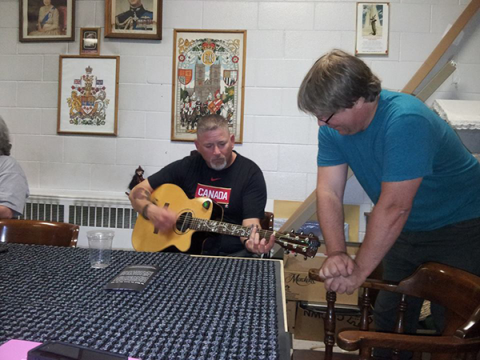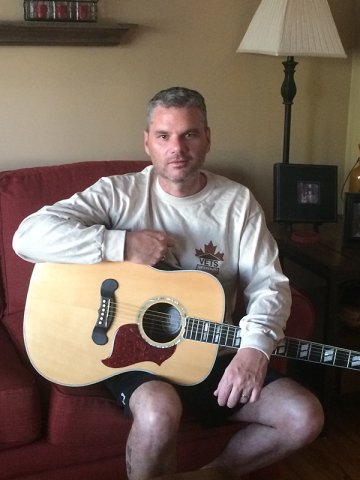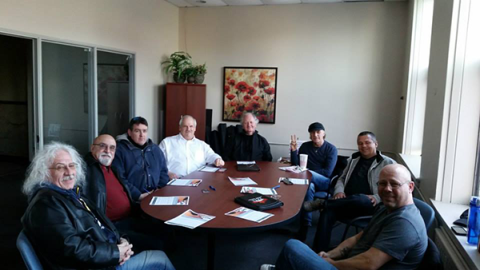
Realizing this tool could help colleagues who were also suffering, he created Guitars 4 Vets, a nationwide network with a very simple goal — give Canada's military and RCMP veterans who are suffering from PTSD or another disability a guitar and some free guitar lessons in the hopes it'll make them feel better. It is unrelated to the U.S. Guitars For Vets, which has chapters all over America.
Samaritanmag spoke to Lowther to find out more about the program.
First off, what is Guitars 4 Vets?
“Guitars 4 Vets is a program within Vets Canada. Vets Canada is a charity I founded five years ago. We help homeless and at-risk veterans and RCMP officers get off the street and back on their feet. We're a national charity, all volunteers. But what we were finding was a lot of the guys or girls had PTSD and other disabilities. So I was trying to come up with a way to help them. So what we do is help them get off the street, get back on their feet.
“And I suffer from PTSD myself. I did two tours of Bosnia and after September 11 on the HSMC Halifax and the only thing that helped me was playing my guitar. That's what helped me.
“I've always played guitar, but I put it down for quite awhile and when I picked it up again when I was going through my PTSD, and all the shit that goes with it, I found that it was a way that I could help myself. Because you know when you get a song in your head, a really shitty song in your head, and you can't get rid of it? That's what PTSD is like on steroids. You just can't break the cycle that's going around in your mind. But if you pick up a guitar, you don't even realize it, but it automatically breaks that cycle because you're using your hands, and you're thinking, and you put so much energy into it that you don't realize what you're doing and it breaks the cycle and it really helped me.
“So I figured if it helped me it'll help everybody. And that's why we started Guitars 4 Vets Canada.”
Were you aware of Guitars For Vets in the U.S.?
"Yes, I knew about Guitars For Vets in the U.S. but we are not affiliated with them. They do things a little differently than us."
Was there a singular moment, a eureka moment, when you realized this could be helpful?
“I did have one of those. It was after I picked it up and played for a bit and the next day I was okay. And that's when I realized, and my wife realized too, that I can calm down. I found myself picking it up when I was having panic attacks or when my moods started spiking for no reason and she would actually take my guitar and give it to me and say, ‘Here.’ And then I realized, ‘Holy shit, what's going on here?’ So I guess my eureka moment was, ‘Is music this powerful that it could help this profoundly?’ Of course, I had to look up ‘music therapy’ (online) and I was blown away.
“I love listening to music. Like, when I'm losing my shit, I'll just jump in my jeep and put the tunes on. I've always kind of done that. But to play it puts it one step above that because you're using your minds and your hands.”

“When I looked into it, it's a lot of cognitive stuff. It breaks the cycle of those thoughts and emotions because you're so focused on playing and learning new chords. I got right into really trying to better myself and learn new chords. And I even got my own instructor, a one-on-one instructor that forced me to get out of the house, get out of the basement and go to my lesson.
“And when I was big time suffering from PTSD, I didn't want to leave the house. So this forced me to get out and get into the world again, just for one little lesson, but it really helped me. And the more I learned, and the more I got into it, I found what works for me and a lot of our people is it gives the person with PTSD a chance to help themselves. Because one thing they do with us is they throw medication at you. If you have PTSD, they'll throw medication at you. And these medications, they say, ‘It'll take 6-8 weeks before you even notice anything. Oh, and it may cause suicidal tendencies.’ Holy shit. Well, most of us are already feeling depression and all that stuff.
“This it just gives us a chance to help ourselves. Yes, we still have to take some of the medication and all that shit, but at least we give ourselves a fighting chance. In that moment, when we're losing our shit, we don't have to take one of the orange pills. We can pick up a guitar and it has the same effect, if not better — I think better than it would taking one of those anxiety pills. I went from taking those anxiety pills to not taking them at all. Just picking up my guitar.”
How does the whole Guitars 4 Vets program work?
“Oh man, it's so cool. A lot of people with PTSD don't do well in groups at first. Once they start feeling better and they trust the people in group, then group therapy or group guitar lessons might be a possibility. But we're not doing that right now. Right now, it's a one-on-one with an instructor and all the instructors we have are all volunteers from across the country. We have a list of instructors from every part of the country. And we have our students are still serving members, the troops, RCMP officers and veterans, both RCMP and DND [Department of National Defence]. And they can be anywhere in the country where we have instructors.
“It's 10 free lessons. And at the end or during, if they need a guitar, we provide a slightly used new guitar or we buy a guitar for them. So they get a guitar and 10 free lessons. Everything is free. But what if we have a guy in Yellowknife who wants to do the program and we don't have any instructors up there? So what I did was I went to one of our instructors here [in Halifax], his name is Stephen Dempster. He did up a video specifically for us. So what we can do is anyone in the country, they go through our website or Facebook page and they have access to our beginner or intermediate video so they can get started no matter where they are. So that just opened up the whole country.
“And I contacted [music store] Long & McQuade and filled them in on what we do and why we do it and their head office contacted me and decided it was a great idea and they decided to partner with us. So they're going to give us really good prices on guitars and, even better they mentioned, ‘Would it be possible to rent guitars for the 10 weeks, the 10 lessons, to see if the students will do it?’ I thought that was a great idea. So we'll have gift cards or gift coupons so you can send the gift cards out to anyone in the country who wants to do the program and you can rent the guitars for free. That's how we can reach the whole country. They sent me a 100 right off the bat. They did the whole program for nothing.”
How can someone volunteer to help out?
“It's pretty simple. Go to our website and they can fill out the volunteer form. And all they have to do is state they want to volunteer for Guitars 4 Vets as an instructor. And if they're someone who wants to take the program, all they have do is the same thing, except they go to the ‘[Request] Assistance’ form and they just state that they want to do the Guitars 4 Vets program and we'll have someone contact them within the hour.”
How many people has the Guitars 4 Vets program helped so far?
“In Atlantic Canada, we have about 20 on the go right now. In Ontario, the numbers were around 14, but since we've opened up it's taken off. Across the country we've got about 50 on the go. And we're just trying to keep up to our list that we had before. We probably had 60 on the list that wanted to do the program, but word of mouth is just spreading the program like crazy.”

“No, but I can see that happening. I always felt like we have to build the foundation first so people can see, ‘Hey look, this organization is helping people for no personal gain just to help... I want on board with that.’ We have some local talent. Hal Bruce, he's from around here. He's in the Beatles musical hall of fame in Liverpool [he holds a world record for playing 214 Beatles songs in a two-hour medley]. He's just amazing. He's probably one of the only Canadians in the Beatles Liverpool hall of fame. He was one of the first guys who jumped on board to help out. I'd love to see someone like Jann Arden and all the caring people that we have, the artists across the country, like Alan Doyle, have them look at it and say, ‘Here's a way that we can help.We know music and we want to support our troops. And we can do it through this program.’”
Sometimes "support the troop" movements can end up being political. I get the sense that's not the case with Guitars 4 Vet. Is that a fair assessment?
“We are so not political. I hate it. If you want to help people, and you want to help people for the right reasons, stay the hell away from politics. And don't point the finger at anybody and don't judge anyone. If you need help, you have a disability, or you have PTSD or other shitty mental disorders, pick up a guitar. This is unbelievable music therapy and it'll change your life. And it is changing so many lives. People are blown away by it.”
Are there things you need that could help your organization?
“Endorsements. We have famous musicians who'll go to the States first, and they'll talk about the troops in the States and do benefit concerts for the troops in the States. Well holy, we've got troops here who are in desperate need. We need guitars. We would love to have a Canadian guitar company jump on board. Plus, we have a charitable number [828604041RR0001] so I mean this could be a total write-off for them. And we need instructors. If you're an instructor right now and you say this is something I could really get behind and support the troops and RCMP and veterans, this is the program for you because it's 100 per cent positive, no negativity, no politics, no bullshit, just real-life help.”
THE SNEAKER BULLETIN